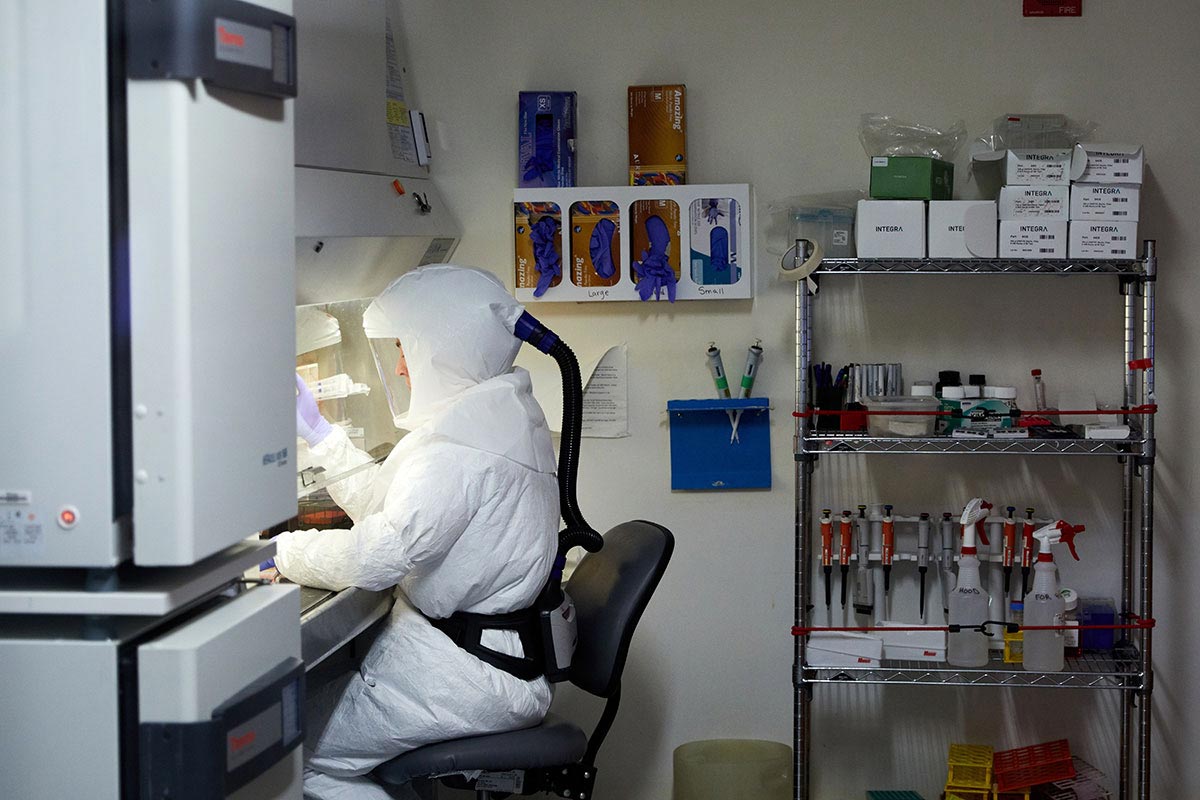Antibody Discovered That Protects Against Broad Range of COVID-19 Virus Variants
0 View
Share this Video
- Publish Date:
- 23 August, 2021
- Category:
- Covid
- Video License
- Standard License
- Imported From:
- Youtube
Tags

Staff scientist Laura VanBlargan, PhD, works with the virus that causes COVID-19 under high biosecurity conditions at Washington University School of Medicine in St. Louis. VanBlargan co-led a study that identified an antibody that is highly protective against a wide variety of viral variants. Credit: Matt Miller/Washington University
Targets a key component of the virus’s spike protein that changes little between variants.
The virus that causes COVID-19 today is not the same as the virus that first made people sick in December 2019. Many of the variants now circulating are partially resistant to some of the antibody-based therapies developed from the parent virus. As the pandemic continues, more variants will inevitably emerge and the resistance problem will only increase.
Researchers at Washington University School of Medicine in St. Louis have identified an antibody that is highly protective at low doses against a wide variety of viral variants. Moreover, the antibody attaches itself to a part of the virus that differs little between the variants, making it unlikely that resistance will develop in this place. The findings, available online in the journal Immunity, could be a step toward developing new antibody-based therapies that are less likely to lose potency if the virus mutates.
“Current antibodies may work against some, but not all variants,” said senior author Michael S. Diamond, MD, PhD, the Herbert S. Gasser Professor of Medicine. “The virus will likely continue to evolve over time and space. Having broadly neutralizing, effective antibodies that work individually and can be linked to make new combinations is likely to prevent resistance.”
SARS-CoV-2, the virus that causes COVID-19, uses a protein called a spike to attach to and invade cells in the body’s airways. Antibodies that prevent spike from attaching to cells neutralize the virus and prevent disease. Many variants have acquired mutations in their spike genes that allow them to evade some of the antibodies generated against the original strain, undermining the effectiveness of antibody-based therapies.
To find neutralizing antibodies that work against a wide variety of variants, the researchers started by immunizing mice with a key component of the spike protein known as the receptor-binding domain. They then extracted antibody-producing cells and obtained 43 antibodies from them that recognize the receptor binding domain. Along with Diamond, the research team included first authors Laura VanBlargan, PhD, a staff scientist; Lucas J. Adams, an MD/PhD student; and Zhuoming Liu, PhD, a staff scientist; as well as co-author Daved Fremont, PhD, professor of pathology and immunology, biochemistry and molecular biophysics, and molecular microbiology.
The researchers screened the 43 antibodies by measuring how well they prevented the original SARS-CoV-2 variant from infecting cells in a dish. Nine of the most potent neutralizing antibodies were then tested in mice to see if they could protect animals infected with the original SARS-CoV-2 from disease. Multiple antibodies have passed both tests, with varying degrees of potency.
The researchers selected the two antibodies that were most effective in protecting mice against disease and tested them against a panel of viral variants. The panel included viruses with spike proteins representing all four variants of concern (alpha, beta, gamma, and delta), two variants of interest (kappa and iota), and several unnamed variants monitored as potential threats. One antibody, SARS2-38, readily neutralized all variants. In addition, a humanized version of SARS2-38 protected mice against diseases caused by two variants: kappa and a virus containing the spike protein from the beta variant. The beta variant is notoriously resistant to antibodies, so its inability to resist SARS2-38 is particularly noteworthy, the researchers noted.
Further experiments determined the precise spot on the spike protein recognized by the antibody, and identified two mutations at that spot that could in principle prevent the antibody from working. However, these mutations are rare in the real world. The researchers searched a database of nearly 800,000 SARS-CoV-2 sequences and found escape mutations in just 0.04% of them.
“This antibody is both highly neutralizing (meaning it works very well at low concentrations) and broadly neutralizing (meaning it works against all variants),” said Diamond, who is also a professor of molecular microbiology and pathology and immunology. “That’s an unusual and highly desirable combination for an antibody. It also binds to a unique site on the spike protein that is not targeted by other developing antibodies. That’s fine for combination therapy. We could start thinking about combining this antibody with another antibody that binds somewhere else to create a combination therapy that is very difficult for the virus to resist.”
Reference: “A potent neutralizing SARS-CoV-2 antibody inhibits variants of concern by exploiting unique binding residues in a highly conserved epitope” by Laura A. VanBlargan, Lucas J. Adams, Zhuoming Liu, Rita E. Chen, Pavlo Gilchuk Saravanan Raju, Brittany K. Smith, Haiyan Zhao, James Brett Case, Emma S. Winkler, Bradley M. Whitener, Lindsay Droit, Ishmael D. Aziati, Traci L. Bricker, Astha Joshi, Pei-Yong Shi, Adrian Creanga, Amarendra Pegu, Scott A. Handley, David Wang, Adrian CM Boon, James E. Crowe, Jr., Sean PJ Whelan, Daved H. Fremont, and Michael S. Diamond, Accepted, Immunity.
DOI: 10.1016/j.immuni.2021.08.016
This study was supported by the National Institutes of Health (NIH), contract and grant numbers 75N93019C00062, HHSN272201700060C, 75N93019C00074, U01 AI151810, R01AI118938, and RO1AI157155; the Defense Advanced Research Project Agency, grant number HR001117S0019; and the Helen Hay Whitney Foundation.










